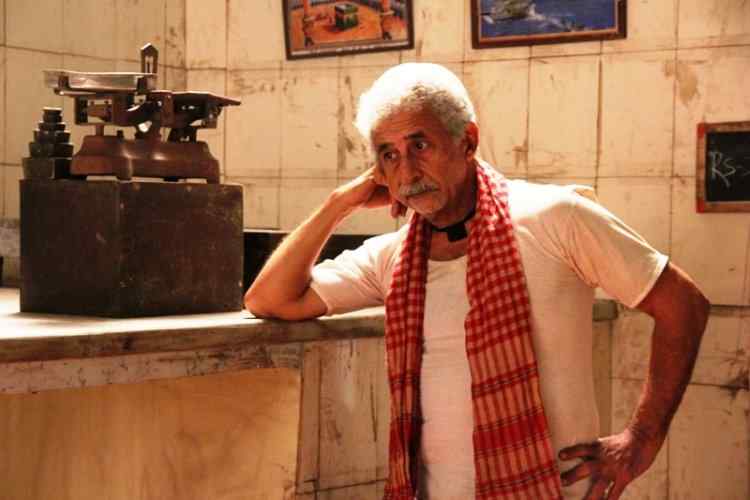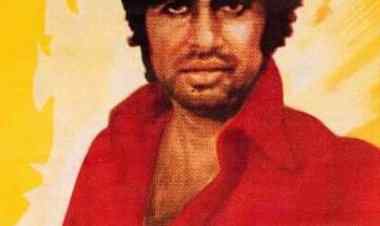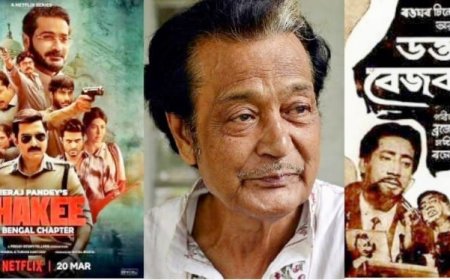BIRTHDAY TRIBUTE NASEERUDDIN SHAH ON HIS 73RD BIRTHDAY
Dr. Shoma A. Chatterji, a distinguished Indian film scholar and esteemed author, pays homage to the illustrious Naseeruddin Shah on the occasion of his 73rd birthday, which is set to grace us on the 20th of July.

The first time I interviewed him was during the shooting of Basu Chatterjee’s tele-film Triyacharitra based on a Hindi story by Shivmurti. This was on the sets of Kamalistan Studios in Mumbai fixed by a prior appointment. By then, Shah was 100 films old and that was the peg for my story. He played a terrible lech in the film who raped his own daughter-in-law in the absence of her husband who had gone off to work somewhere else.
It was a very good interview and at the end of it, he asked me if I had transport to go home which was very far. So, in a gentlemanly manner, he organized for his driver to reach me to Andheri station to facilitate my onward train journey back home. He was quite professional but was neither rude nor arrogant and did not wear any starry airs. That is the picture I carried with me for many years of the great actor Naseeruddin Shah. This was back in the early Nineties.
Thirty years down the line and he must have packed in many more outstanding performances to reach far beyond that first hundred. It is no great surprise that the versatile actor with God-Alone-Knows how many awards should have been picked to deliver Satyajit Ray Memorial in Kolkata in 2014. The subject of his speech was “The Honest Actor.” This writer found Naseeruddin a changed man, more mature not only in years, but also in experience. He had become more cerebral on the one hand and cynical on the other. Let us try to understand ‘why’.
About his coming down to Mumbai (then Bombay) he says, “The year was 1968. I was 18 and went knocking from door to door for work after finishing school in Nainital. I finally landed a bit part in the Rajendra Kumar-Saira Banu starrer Aman as an extra. Pocketing the princely sum of Rs 7, I boarded the train back home. This experience increased my determination to succeed.”
“Theatre happened to me when I was a student of St. Joseph’s at Nainital and I won the Best Actor Shield,” he goes on to add. I came in touch with the Kendalls, who came with their touring theatre, Shakespearean. Geoffrey Kendall encouraged me to take up acting. So, despite the Mumbai fiasco, or rather, because of it, I decided to return later, to the same city to chase my dreams, well-armed and well-equipped. Geoffrey Kendall ran a group theatre called Shakespereana and staged abstracts from Shakespeare. They sold tickets are Re.1.00 but they did not have many takers because Shakespeare was not exactly popular among the middle-class Bombayites around that time. Over time however, I realized his true greatness lay somewhere else: his real mission was to communicate a text; all other activities were subservient to this main purpose — communicating a particular text to the audience.”
At the National School of Drama, he considers himself very lucky because the great Ibrahim Alkazi was in charge of affairs and the experience for Shah was unprecedented. “I did a large variety of roles and realised that I could become an actor in Bollywood. Not satisfied just with the NSD diploma, I went to the FTII in Pune. I did the acting course and got close to two batchmates, Tom Alter and Benjamin Gilani. The three of us put our heads together to form a theatre group called Motley and came down to Mumbai.”
“We chose the name Motley as it is a pseudonym for a group of three English stage designers, Sophia Harris, Margaret F. Harris and Elizabeth Montgomery. Their first production was Shakespeare’s Romeo and Juliet in 1932. They designed three to four productions in a year. Our group, Motley, got known with plays like Waiting for Godot, The Lesson, The Liar and The Bear. Though Tom and Benjamin later went their way, Motley is still around. At Think Fest 2013, I performed a dramatised reading of Saadat Hasan Manto’s Toba Tek Singh,” Shah elaborates.
“At FTII, Girish Karnad who taught us recommended me to Shyam Benegal. I was screen-tested for my role in Nishaant. The film came and went, and no producer lined up outside my door. I went on acting in one Benegal film after another: Bhoomika, Manthan, Godhuli and Junoon. Working with Shyam was a wonderful experience. Since NSD had armed with me with considerable stage experience, I was not at all camera-conscious I loved the easy pace with which Shyam functions. I learnt a lot and after Manthan, outside producers began to pour in, even for roles in mainstream films, adds Shah.
Shah believes entirely in the honesty an actor should ideally define oneself with, whether he is acting or doing something else. According to Shah, “An ‘honest’ actor is a contradiction in terms. When you are playing someone you are not and are never going to me, how can you be honest? An ‘honest actor’ according to me, is a work in progress, an ongoing struggle for an actor. Honesty in acting by its very nature is false. There just cannot be anything such as a ‘dishonest’ actor because honesty in an actor is a ‘given’ and not a gift or a blessing for the audience or for the director. The world is made up of every kind of actor – the confident actor, the selfish actor, the generous actor, the plodding actor, the clever actor and the diffident actor. Acting is a craft and the actor must be an honest craftsman and it his responsibility to remain honest to his craft which will transfer this honesty to his audience. As an actor having spent around four decades in the trade, I feel it is my responsibility to give back to the next generation a bit of what I have learnt and imbibed from the craft. And if acting is a craft then there is nothing remotely metaphysical about it. I do this through workshops and lec-dems I am invited to from time to time.”
Asked to elaborate on his ideas about the difference between art films in which he made a name for himself and mainstream masala films which have also been a part of his entire oeuvre, Shah says, “Every young man or woman wants to become an actor wants to be a part of mainstream cinema and I would be lying if I said I was any different. You become an actor because you want to be famous. It was not my doing that I got associated with serious cinema. I would've taken whatever came to me. If I had been offered the lousiest role in a lousy commercial film, I would have done that also because I needed work. But I was very lucky that these films were being made, so I did not need to do lousy commercial films.”
Asked to elaborate on his experience in a few mainstream films he says, “I never believed Tridev would run for a day. Yet, it prolonged my career by ten years. I am grateful to Rajiv Rai for having taken me in the film. But it gave me a box office hit I had never experienced over ten years in the industry. Ten years later it gave me another one, Mohra, again by Rajiv Rai. And ten years later it gave me The Dirty Picture. In fact, my dossier has more commercial films than all the art films I did put together. I worked in Mahesh Bhatt's Sir, Dharmesh Darshan's Lootere, Karma with Dilip Kumar and Bonny Kapoor's Rajkumar in which I did a double role.”
Shah is very clear about deciding to accept a role based solely on his instincts and earlier on in his career, this led to drastic results. But slowly, he learnt to value the qualitative worth of a total project rather than just his own role in it. Occasionally, he does take on roles in films he genuinely feels ought to be made, such as Bandish Bandits. “I have discovered that every script reveals itself within the first ten pages. I do not need to read further. If I like it, I read further. When I’ve read the script, I try to work out whether this is going to be fun or not. I have acted in some films no one has even heard of, much less seen,” he adds.
In director Anand Tiwari's web-show Bandish Bandits streaming on Amazon Prime Video, Naseeruddin Shah's central character of Pandit Radhemohan Rathore, a Hindustani classical virtuoso, cuts a formidable figure. He is a patriarch with a conspicuously inflated ego that urges him to establish a gharana named after him, thereby setting the backdrop for the story that traverses the musical terrain of the country.
Asked to elaborate in detail about his role in Bandish Bandits, Shah says, “I found the whole story very interesting; I thought that the theme of the conflict between the different styles of singing and also the conflict between and among the various gharanas along with the politics that goes on — was extremely interesting. The fact that Pandit Ji wasn't a 'goody-goody' guy, and that he had grey shades — negative shades also — reminded me of a lot of some people and teachers I've known, my father being one of them. I drew upon him to give this benevolent, but stern attitude to my character.”
He goes on to add how he found an ideal music teacher in Akshat who explained the alaaps in great detail to him. He first made his famous star-pupil practice the notes right through the seven notes of the sargam and elaborated on how Pandit ji would have rendered them. “He first made me practice singing the notes, and then do the aakaar, as they call it, where one goes 'aaa aaa' with each of the notes. I had to work really hard, but I must say I enjoyed it because it has been a long time since I had a part which demanded that I extend myself, and for which I had to do actual physical work.”
Asked to name his favourite roles, Shah says, “There are just too many to recall after all these years. Shyam Benegal’s Manthan is one. Manthan brought me critical and public recognition and fetched me a Special Award from Filmfare in 1977, nine years after the Aman fiasco had forced me to pack my bags and leave Mumbai. Govind Nihalani’s Aakrosh in which I portrayed a straightforward, committed lawyer is another favourite. The self-respecting, blind teacher in Sai Paranjpye's Sparsh is another one. The dying drug addict in Robin Dharmaraj’s hard-hitting Chakra, the confused husband and father in Shekhar Kapoor’s Masoom, the role in Gautam Ghose’s Paar which made me shed more than five kilos are unforgettable not so much for my work as for the films themselves. But I truly consider it an honour to be chosen by Gulzar Saab to play Mirza Ghalib in his bio-serial on the great poet.”
And on that note, we part.
***
What's Your Reaction?

































































